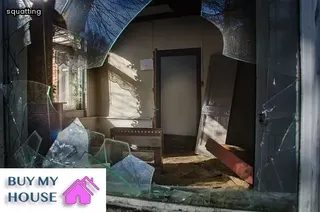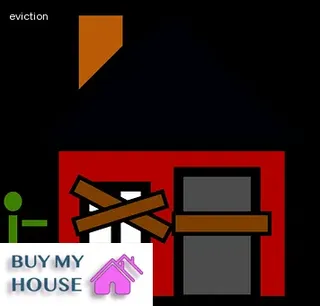Squatting is an act of occupying a home or land without the permission of the legal owner. In some cases, squatters may even seek to become a rightful owner through adverse possession laws.
Adverse possession is when someone who has been in continuous and uninterrupted possession of real estate for a certain period of time can acquire legal title to that property. In Ohio, the term “adverse possession” refers to a process by which an individual can gain title to property that they have continuously used as if it were their own for at least 21 years.
To qualify as an adverse possessor in Ohio, the squatter must show that they have openly occupied the property and paid taxes on it, while also ensuring that they are not trespassing on another’s property or using it unlawfully. Furthermore, squatters must demonstrate that they have made substantial improvements and repairs to the property over the 21-year period in order for their claim to be successful.
It is important to note that squatting does not provide any rights until after 21 years of continuous occupation, so it is essential for individuals seeking such rights to understand all applicable laws and regulations in order to ensure their claim meets all requirements before taking up residence.

Holdover tenants and squatters differ in a few key ways. Holdover tenants are those who remain in a rental agreement after their lease has expired.
While they are no longer legally bound to the property, they still maintain a relationship with the landlord and may be subject to certain terms outlined by their original rental agreement. Unlike holdover tenants, squatters are individuals that occupy someone else's land without permission from the owner or any legal right.
Squatters typically claim a piece of land when it is abandoned and unoccupied, but can also take up residence on land that is not vacant. Squatting often occurs when an individual or group wishes to challenge an existing ownership arrangement or contest laws protecting private property rights.
In Ohio, squatters have certain rights under adverse possession laws which must be considered before evicting them from a property.
Exploring the rights of Ohio's squatters is a complex matter, requiring an understanding of both the state and federal laws governing adverse possession. Squatter's rights in Ohio are based on the common law principle of adverse possession, which allows a person to gain legal title to real estate by occupying it continuously for a certain period of time.
In Ohio, adverse possession requires that the squatter openly inhabit and use the property for more than ten years without interruption or challenge from its rightful owner. During this period, the squatter must pay all taxes associated with the property and have exclusive control over it.
Furthermore, they must have a good faith belief that they are legally entitled to the land. If these requirements are met, then a claim may be made for title to the land.
Understanding one’s rights as a squatter in Ohio is crucial to ensuring that their interests are protected should something occur during their occupancy of another's property.

Navigating Ohio's Adverse Possession laws can be a challenging task, but it is important to understand the basics of this legal concept if you are considering using it to gain title and ownership rights to a property. Squatter's rights, as they are commonly known, refer to the legal principle of adverse possession which allows individuals who have been occupying a piece of land for a prolonged period of time with certain requirements met, to gain ownership rights even if they do not have legal title.
In Ohio, adverse possession requires an open, notorious, continuous and exclusive use and occupation of the land for fifteen years or more. Additionally, the individual claiming possession must pay taxes on the property and make improvements such as building fences or making repairs.
Knowing all these conditions can help you determine whether you qualify under Ohio's adverse possession laws.
In Ohio, tenants, licensees and invitees have different rights when it comes to adverse possession laws. Tenants are the most protected with full legal access to the property they inhabit.
A tenant has a contractual agreement with the owner of the property. This agreement gives them exclusive rights to use, possess and enjoy the land and any improvements made on it.
Licensees are people who have permission from an owner or tenant to enter a property for a specific purpose, such as hunting or fishing on someone else's land. They do not have exclusive right of possession but do have some legal protection if they remain on the premises after their license runs out or is revoked by the owner.
Invitees are those who are invited onto someone else's property and may receive certain privileges while there, such as permission to use public facilities like swimming pools or golf courses. Unlike tenants or licensees, invitees do not have any legally established rights since they are only allowed onto another person's land at their discretion.
All of these differences should be taken into consideration when exploring squatter's rights in Ohio and understanding how adverse possession laws apply in each situation.

In Ohio, squatter's rights are governed by the state's adverse possession laws. These laws allow a person to obtain legal title to a property if they occupy it for a certain period of time while meeting other conditions set out by the statute.
To understand the statutes related to occupancy rights in Ohio, it is important to be aware of the state’s definition of adverse possession and its requirements. Under Ohio law, an individual must possess and occupy a property for at least 21 years in order to claim it through adverse possession.
Additionally, those claiming ownership must pay taxes on the property, use it as if they own it, and make improvements or repairs to it during that time period. Furthermore, their occupation must be open and notorious such that any reasonable landowner would know of their presence on the property.
Finally, those claiming ownership through adverse possession must have had a good faith belief that they were entitled to do so even if this belief was mistaken or unfounded. Understanding these different elements is key to understanding occupancy rights in Ohio when exploring squatter's rights.
Removing squatters from a property can provide a sense of security to the owner, as they are able to be sure that their land is not in use without their permission. However, there can be both pros and cons to removing squatters depending on the situation.
On one hand, owners may face expensive legal fees if they do not remove squatters from their property in a timely manner. Additionally, evicting someone from their home may result in harm to the individual or family involved, and could even lead to homelessness.
On the other hand, allowing squatters to remain on your property can create legal complications that may cause problems down the road. If you are unsure of what steps to take when dealing with squatter's rights in Ohio, it is important to consult an attorney who specializes in adverse possession laws in order to ensure that all parties involved understand their rights and obligations.

Removing unwanted squatters from a property can be a difficult and time consuming process, but it is important to understand the laws surrounding the issue in Ohio before taking any action. Squatters often have rights to remain on someone’s property if they have been present for an extended period of time, so it is important for property owners to understand how to effectively remove them.
Adverse possession laws in Ohio require that squatters must occupy a property for at least 21 years before they may claim the title of ownership. In order to remove a squatter, the landowner must be able to prove that they had knowledge of the squatter’s presence on their property and that they took reasonable steps to reclaim it.
This may include documenting instances of trespassing and filing an eviction notice with local law enforcement. It also helps if neighbors or other witnesses can provide evidence of the landlord’s attempts to reclaim their land.
Additionally, depending on the case, legal action may be necessary in order for the landowner to regain control over their property. Understanding these aspects of adverse possession laws in Ohio can help landowners take back control over their properties more quickly and effectively.
When it comes to potential solutions for homeowners impacted by squatting, there are a few things that can be done. First, understanding the legal framework of adverse possession laws in Ohio is key.
Landowners should take the time to familiarize themselves with their state's regulations regarding squatting and adverse possession so they can understand their rights and prepare to take appropriate action. Secondly, homeowners should develop an action plan if faced with a squatter issue.
This could include consulting a lawyer or working with local law enforcement as well as taking steps such as changing locks and posting “No Trespassing” signs on the property. Additionally, community education is important when it comes to protecting homeowners from squatters.
By educating residents on their rights and responsibilities when it comes to property ownership and squatting issues, homeowners can better protect themselves from any potential problems that may arise. Finally, homeowners may want to consider alternative housing options for those experiencing homelessness who might otherwise turn to squatting as a means of shelter.
By offering housing assistance through shelters or other programs, this could help alleviate some of the pressure caused by housing insecurity while also reducing instances of squatting in communities across Ohio.

If you're unable to remove a trespasser from your property, it's important to understand the options available to you. In Ohio, adverse possession laws can be used in some cases to establish legal title to a property.
An experienced attorney who is knowledgeable of Ohio's squatter's rights should be consulted in order to determine whether or not this path is viable. Additionally, certain legal remedies may be available such as an action for ejectment or an injunction.
The former seeks damages and the removal of the trespasser while the latter is a court order that prohibits them from entering onto the property again. It's also important to note that changing locks or attempting self-help are not recommended since these actions could result in criminal charges being brought against you.
Documenting evidence that trespassers or squatters wrongfully entered your property is a key part of successfully exploring your squatter's rights in Ohio. If you can provide proof that the individuals did not have permission to use the land, then you may be able to prove adverse possession.
To begin gathering evidence, start by creating a timeline of events. Document any conversations or notices you gave to the trespassers and take pictures of individuals on your property as well as any structures they erected without consent.
Don't forget to collect witness statements from neighbors and other individuals who may have seen the trespassers on the land. Additionally, if there are records of past claims or disputes between you and the squatters, make sure to include this information in your documentation.
Finally, it is important to be mindful of any potential defenses used by the squatters and prepare accordingly so that you can effectively counter their arguments in court.

Squatters can be a costly nuisance for landowners, but there are cost-effective solutions to prevent and manage squatters. One of the most powerful tools is understanding the laws surrounding squatting in Ohio.
Adverse possession laws allow an individual to gain legal rights to land they have been occupying without permission from the true owner. It's important to know your rights as a landowner and to understand what qualifies as adverse possession in Ohio.
A few measures can help deter potential squatters, such as regularly checking on vacant land, using 'No Trespassing' signs, and making improvements that demonstrate intent of ownership. Landowners should also consider creating clear boundaries for their property with fences or other physical barriers.
Finally, if a squatter has already occupied property, it's important for the landowner to take action quickly and make sure all paperwork is filed correctly with the appropriate governing authority. Taking these steps can help keep unwanted visitors away from your property and protect you from any potential legal issues.
When it comes to squatter's rights in Ohio, it is important for property owners to be aware of their rights and the laws regarding adverse possession. Thankfully, there are free downloads available that can help protect against squatting.
These downloads provide comprehensive information about the legal aspects of adverse possession laws in Ohio, including details about the time period and conditions required for a squatter to gain legal title to a property. Additionally, these downloads provide valuable advice on how to safeguard against squatting, such as steps for preventing a squatter from occupying your land and strategies for dealing with an existing squatter situation.
With this knowledge at hand, property owners can better protect themselves from potential squatters and ensure that their rights remain intact.

The issue of squatting is one that many property owners face in Ohio, as adverse possession laws provide certain protections to those who occupy land that they do not own. As such, it is important to know how to protect your property from being taken over by squatters.
One of the best ways to prevent this is to regularly check your land and any buildings located on it for signs of occupation. Additionally, be sure to post a “No Trespassing” sign in a highly visible area, as this can discourage people from breaking the law and occupying your property without permission.
You should also keep records of all transactions related to your property, such as sales or leases agreements and title documents, so you have proof of ownership in case you are ever faced with a dispute regarding the ownership of your land or buildings. Lastly, if you notice someone has moved onto your property without permission or authorization, contact local law enforcement immediately as they can help remove any unwanted occupiers from your land.
In Ohio, a squatter's rights are determined by the state’s Adverse Possession laws. These laws specify how long a squatter must live on the property before they can gain legal title to it.
Generally speaking, a squatter must occupy and use the property for 15 years in order to gain legal title. During this period of time, the squatter must pay all taxes associated with the property and take action to maintain it.
If these requirements are met, then the squatter may be able to obtain legal title after 15 years of possession. In some cases, however, it is possible for squatters to gain title with less than 15 years of possession if they can prove that their occupation was exclusive and continuous and that they made improvements to the property.
It is important to note that each case is unique, so it is essential for squatters in Ohio to understand all applicable laws before taking any action.

In Ohio, the process of evicting squatters can be a lengthy and complicated one. The state has specific laws in place to provide protection to those who hold adverse possession rights, with the length of time it takes to evict squatters determined by how long they have held the property.
According to Ohio statute §5311.01, individuals must meet certain qualifications and hold the property for 15 years before they can gain title through adverse possession rights.
If an individual has held a property for less than 15 years and does not meet all of the requirements listed in the statute, it is still possible to evict them from the premises. This process typically involves filing an eviction lawsuit through your local court system or working with a real estate attorney who specializes in adverse possession claims.
It is important to remember that even if you are successful at obtaining an eviction order, it may take some time for law enforcement to actually remove them from your property. Taking steps to protect your legal rights as soon as possible is essential when dealing with squatters in Ohio.
In Ohio, a squatter must possess and maintain possession of a property for 21 years in order to obtain title through adverse possession. To establish such a claim, the squatter must demonstrate that they are “openly occupying” the land, meaning they must be occupying it with the intent to become an owner—not just using it casually.
The occupant must also prove that their occupation is hostile and exclusive, not shared with others or with permission from the actual owner. Furthermore, the squatter must show that they had paid all taxes on the property during their period of occupation and that they have been in continuous possession of it for at least 21 years.
If all these requirements are met, then according to Ohio law, title will be held by the squatter after the 21-year period has elapsed.
The shortest time for a squatter to gain rights in Ohio is 15 years. According to the Ohio Adverse Possession Law (Ohio Rev.
Code Ann. § § 2305.
06 and 2305.19), squatters must live on the land for 15 years without interruption in order to acquire title by adverse possession, meaning that they have a right to exclusive possession of the property and are legally recognized by the state as owners of that property.
Squatters must also be able to prove that they had possession over the land openly and notoriously with an intent to possess it, pay taxes on the land, continuously occupy it for 15 years, and make improvements or repairs on the property. If all of these criteria are met, then Ohio law will recognize them as owners of the property after 15 years.